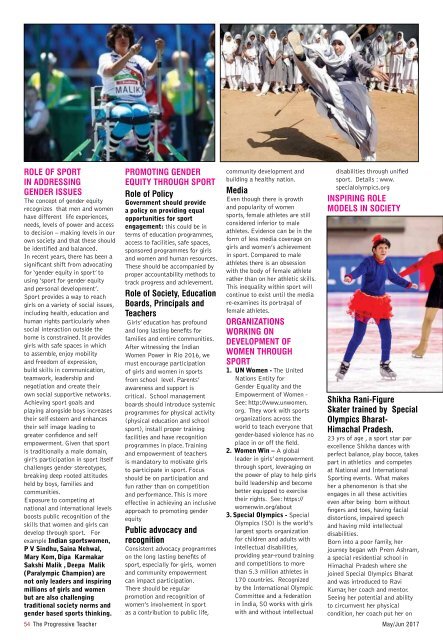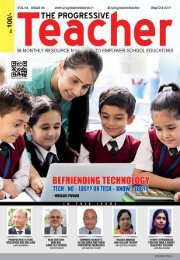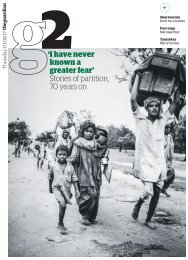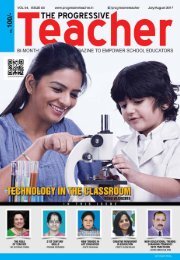revised_tpt_may_june_17 combine
You also want an ePaper? Increase the reach of your titles
YUMPU automatically turns print PDFs into web optimized ePapers that Google loves.
Role of Sport<br />
in addressing<br />
Gender issues<br />
The concept of gender equity<br />
recognizes that men and women<br />
have different life experiences,<br />
needs, levels of power and access<br />
to decision – making levels in our<br />
own society and that these should<br />
be identified and balanced.<br />
In recent years, there has been a<br />
significant shift from advocating<br />
for ‘gender equity in sport’ to<br />
using ‘sport for gender equity<br />
and personal development’.<br />
Sport provides a way to reach<br />
girls on a variety of social issues,<br />
including health, education and<br />
human rights particularly when<br />
social interaction outside the<br />
home is constrained. It provides<br />
girls with safe spaces in which<br />
to assemble, enjoy mobility<br />
and freedom of expression,<br />
build skills in communication,<br />
teamwork, leadership and<br />
negotiation and create their<br />
own social supportive networks.<br />
Achieving sport goals and<br />
playing alongside boys increases<br />
their self esteem and enhances<br />
their self image leading to<br />
greater confidence and self<br />
empowerment. Given that sport<br />
is traditionally a male domain,<br />
girl’s participation in sport itself<br />
challenges gender stereotypes,<br />
breaking deep rooted attitudes<br />
held by boys, families and<br />
communities.<br />
Exposure to competing at<br />
national and international levels<br />
boosts public recognition of the<br />
skills that women and girls can<br />
develop through sport. For<br />
example Indian sportswomen,<br />
P V Sindhu, Saina Nehwal,<br />
Mary Kom, Dipa Karmakar<br />
Sakshi Malik , Deepa Malik<br />
(Paralympic Champion) are<br />
not only leaders and inspiring<br />
millions of girls and women<br />
but are also challenging<br />
traditional society norms and<br />
gender based sports thinking.<br />
Promoting gender<br />
equity through sport<br />
Role of Policy<br />
Government should provide<br />
a policy on providing equal<br />
opportunities for sport<br />
engagement: this could be in<br />
terms of education programmes,<br />
access to facilities, safe spaces,<br />
sponsored programmes for girls<br />
and women and human resources.<br />
These should be accompanied by<br />
proper accountability methods to<br />
track progress and achievement.<br />
Role of Society, Education<br />
Boards, Principals and<br />
Teachers<br />
Girls’ education has profound<br />
and long lasting benefits for<br />
families and entire communities.<br />
After witnessing the Indian<br />
Women Power in Rio 2016, we<br />
must encourage participation<br />
of girls and women in sports<br />
from school level. Parents’<br />
awareness and support is<br />
critical. School management<br />
boards should introduce systemic<br />
programmes for physical activity<br />
(physical education and school<br />
sport), install proper training<br />
facilities and have recognition<br />
programmes in place. Training<br />
and empowerment of teachers<br />
is mandatory to motivate girls<br />
to participate in sport. Focus<br />
should be on participation and<br />
fun rather than on competition<br />
and performance. This is more<br />
effective in achieving an inclusive<br />
approach to promoting gender<br />
equity<br />
Public advocacy and<br />
recognition<br />
Consistent advocacy programmes<br />
on the long lasting benefits of<br />
sport, especially for girls, women<br />
and community empowerment<br />
can impact participation.<br />
There should be regular<br />
promotion and recognition of<br />
women’s involvement in sport<br />
as a contribution to public life,<br />
community development and<br />
building a healthy nation.<br />
Media<br />
Even though there is growth<br />
and popularity of women<br />
sports, female athletes are still<br />
considered inferior to male<br />
athletes. Evidence can be in the<br />
form of less media coverage on<br />
girls and women’s achievement<br />
in sport. Compared to male<br />
athletes there is an obsession<br />
with the body of female athlete<br />
rather than on her athletic skills.<br />
This inequality within sport will<br />
continue to exist until the media<br />
re-examines its portrayal of<br />
female athletes.<br />
Organizations<br />
working on<br />
Development of<br />
Women through<br />
Sport<br />
1. UN Women - The United<br />
Nations Entity for<br />
Gender Equality and the<br />
Empowerment of Women -<br />
See: http://www.unwomen.<br />
org. They work with sports<br />
organizations across the<br />
world to teach everyone that<br />
gender-based violence has no<br />
place in or off the field.<br />
2. Women Win – A global<br />
leader in girls’ empowerment<br />
through sport, leveraging on<br />
the power of play to help girls<br />
build leadership and become<br />
better equipped to exercise<br />
their rights. See: https://<br />
womenwin.org/about<br />
3. Special Olympics - Special<br />
Olympics (SO) is the world’s<br />
largest sports organization<br />
for children and adults with<br />
intellectual disabilities,<br />
providing year-round training<br />
and competitions to more<br />
than 5.3 million athletes in<br />
<strong>17</strong>0 countries. Recognized<br />
by the International Olympic<br />
Committee and a federation<br />
in India, SO works with girls<br />
with and without intellectual<br />
disabilities through unified<br />
sport. Details : www.<br />
specialolympics.org<br />
INSPIRING ROLE<br />
MODELS IN SOCIETY<br />
Shikha Rani-Figure<br />
Skater trained by Special<br />
Olympics Bharat-<br />
Himachal Pradesh.<br />
23 yrs of age , a sport star par<br />
excellence Shikha dances with<br />
perfect balance, play bocce, takes<br />
part in athletics and competes<br />
at National and International<br />
Sporting events. What makes<br />
her a phenomenon is that she<br />
engages in all these activities<br />
even after being born without<br />
fingers and toes, having facial<br />
distortions, impaired speech<br />
and having mild intellectual<br />
disabilities.<br />
Born into a poor family, her<br />
journey began wth Prem Ashram,<br />
a special residential school in<br />
Himachal Pradesh where she<br />
joined Special Olympics Bharat<br />
and was introduced to Ravi<br />
Kumar, her coach and mentor.<br />
Seeing her potential and ability<br />
to circumvent her physical<br />
condition, her coach put her on<br />
54 The Progressive Teacher May/Jun 20<strong>17</strong>







